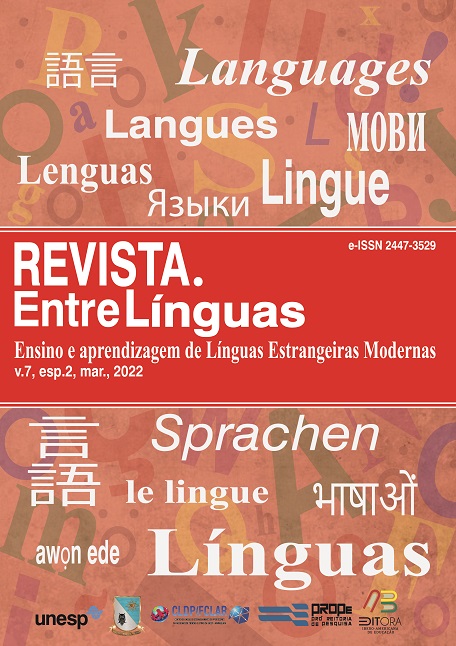Estrategia del hemisferio derecho y consideración del perfil lateral como tecnología innovadora para la enseñanza del ruso como lengua extranjera a estudiantes chinos
DOI:
https://doi.org/10.29051/el.v8iesp.2.17324Palabras clave:
Cognitive style, Functional asymmetry of the two cerebral hemispheres, Right-hemisphere educational strategy, Russian language, Chinese studentsResumen
El estudio es relevante debido a un creciente interés científico en las características específicas del pensamiento y los estilos cognitivos de las civilizaciones occidentales y orientales, así como de los grupos étnicos individuales que componen estas civilizaciones, en la confluencia de las humanidades y las ciencias naturales. Los autores de este artículo consideran la conexión entre un fenómeno psicofisiológico como la asimetría lateral de los hemisferios cerebrales y el enfoque cognitivo en la enseñanza del ruso como lengua extranjera. Según el estilo cognitivo, el pensamiento oriental se refiere al hemisferio derecho, mientras que el pensamiento occidental se inclina al hemisferio izquierdo, lo que genera una situación de conflicto cognitivo-académico en el proceso de aprendizaje. El artículo aborda la solución de los problemas indicados causados por la insuficiente consideración de las características etno-psico-fisiológicas de tales estudiantes. El documento corrobora la tesis de que los chinos pueden dominar el conocimiento, desarrollar diversas habilidades y destrezas utilizando la estrategia de aprendizaje del hemisferio derecho con la debida consideración a la teoría de la asimetría funcional de los hemisferios cerebrales.
Descargas
Citas
AZIMOV, E. G.; SHCHUKIN, A. N. Novyi slovar metodicheskikh terminov i ponyatii (teoriya i praktika obucheniya yazykam) [The new dictionary of methodical term and concepts (the theory and practice of teaching languages)]. Moscow: IKAR, 2009.
BADDELEY, A.; GATHERCOLE, S.; PAPAGNO, C. The phonological loop as a language learning device. Psychological Review, v. 105, n. 1, p. 158-173, 1998.
BIM, I. L. Lichnostno-orientirovannyi podkhod – osnovnaya strategiya obnovleniya shkoly [The personality-oriented approach as the main strategy of renewing school]. Inostrannye yazyki v shkole, n. 2, p.11-15, 2002.
KABARDOV, M. K. Kommunikativnye i kognitivnye sostavlyayushchie yazykovykh sposobnostei: Individualno-tipologicheskii podkhod [Communicative and cognitive components of language skills: individual-based and typological approach]. 2001. Thesis (Doctor Degree in Psychology) – Moscow, 2001.
KHROMOV, S. S.; SHUTOVA, M. N.; NESTEROVA, T. V. Linguodidactic framework of teaching russian intonation to a multinational audience in light of experimental data. Revista EntreLinguas, v. 7, n. 2, 2021. DOI: 10.29051/el.v7iesp.2.15140
KULIKOVA, O. V. Neirodidakticheskii podkhod kak faktor povysheniya kachestva obucheniya inoyazychnomu professionalnomu obshcheniyu [The neuro-didactic approach as a factor of increasing the quality of teaching professional communication in a foreign language]. Vestnik Moskovskogo gosudarstvennogo lingvisticheskogo universiteta, v. 14, n. 700, 2014. Available in: https://cyberleninka.ru/article/n/neyrodidakticheskiy-podhod-kak-faktor-povysheniya-kachestva-obucheniya-inoyazychnomu-professionalnomu-obscheniyu. Access in: 07 Oct. 2021.
NISBETT, R. et al. Kultura i sistemy myshleniya: sravnenie kholisticheskogo i analiticheskogo poznaniya [Culture and thinking systems: the comparison of holistic and analytical cognition]. Psikhologicheskii zhurnal, v. 32, n. 1, p. 55-86, 2011. Available in: https://publications.hse.ru/pubs/share/folder/ck1rjm89ef/70690998.pdf. Access in: 17 Oct. 2021.
PERSIYANOVA, S. G.; LIU, I. Sopostavitelnyi analiz kineticheskogo yazyka u predstavitelei russkoi i kitaiskoi kultur [The comparative analysis of sign languages used by the Chinese and Russians]. Moscow, 2018.
PERSIYANOVA, S. G.; LIU, S. Grammaticheskie trudnosti dlya studentov iz Kitaya pri izuchenii russkogo yazyka [Grammatical difficulties for the Chinese students learning the Russian language]. Moscow, 2017.
POTAPOV, A. S. Psikhologicheskoe obosnovanie sistemy obucheniya s uchetom lateralnoi asimmetrii polusharii golovnogo mozga [The psychological foundation of educational system on the basis of the lateral asymmetry of cerebral hemispheres]. 2002. Thesis (Doctor Degree in Psychology) – Moscow, 2002.
SHANTUROVA, G. A. K voprosu o razvitii emotsionalnogo intellekta vtorichnoi yazykovoi lichnosti pri obuchenii russkomu yazyku kak inostrannomu v kitaiskoi auditorii [On the issue of developing the emotional intelligence of secondary language personality when teaching the Chinese students Russian as a foreign language]. Pedagogicheskii zhurnal, v. 9, n. 1-1, p. 562-567, 2019.
SHANTUROVA, G. A. Neirodidakticheskii podkhod v etnoorientirovannoi modeli obucheniya [The neuro-didactic approach to the ethno-oriented model of education]. RUDN, v. 2, p. 372-375, 2017.
SHUTOVA, M. N. Trudnosti obucheniya kitaiskikh uchashchikhsya russkomu konsonantizmu [The difficulties of teaching the Chinese the Russian consonantism]. In: MEZHDUNARODNOGO KONGRESSA PREPODAVATELEI I RUKOVODITELEI PODGOTOVITELNYKH FAKULTETOV VUZOV RF, 4., 2020. Annals […]. RUDN-GIRYaP, 2020. p. 864-868.
SHUTOVA, M. N.; JIANG, Y. H. Sopostavlenie russkoi intonatsii i kitaiskogo tona [The comparison of the Russian intonation and the Chinese tone]. Moscow: Gos. institut russkogo yazyka im. A.S. Pushkina, 2018.
Publicado
Cómo citar
Número
Sección
Licencia

Esta obra está bajo una licencia internacional Creative Commons Atribución-NoComercial-CompartirIgual 4.0.
Os manuscritos aceitos e publicados são de propriedade da Revista EntreLínguas. Os artigos publicados e as referências citadas na Revista EntreLínguas são de inteira responsabilidade de seus autores.
Transferência de direitos autorais – autorização para publicação
Caso o artigo submetido seja aprovado para publicação, já fica acordado que o(s) autor(es) autoriza(m) a UNESP a reproduzi-lo e publicá-lo na EntreLínguas, entendendo-se os termos “reprodução” e “publicação” conforme definição respectivamente dos incisos VI e I do artigo 5° da Lei 9610/98. O artigo poderá ser acessado pela rede mundial de computadores (Internet), sendo permitidas, a título gratuito, a consulta e a reprodução de exemplar do artigo para uso próprio de quem a consulta, desde que haja a citação ao texto consultado. Essa autorização de publicação 328 EntreLínguas, Araraquara, v. 1, n .2, p. 323-328, jul./dez. 2015 não tem limitação de tempo, ficando a UNESP responsável pela manutenção da identificação do(s) autor(es) do artigo. Os artigos publicados e as referências citadas na Revista EntreLínguas são de inteira responsabilidade de seus autores.











